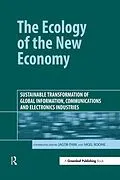This work explores, documents and raises awareness of sustainability concerns arising from the emerging global information economy. The information economy is defined in the broadest sense possible, including software, hardware, telecommunication and advanced communication technologies.
Autorentext
Jacob Park, Nigel Roome
Zusammenfassung
A "revolution" is taking place in the development of global information and communications technologies. In slightly more than a decade, the World Wide Web has gone from the idea of an obscure English scientist to a consumer-oriented technology system with an expected one billion users by 2005. The technologies that enable this to happen are advancing rapidly, which is leading to both an unprecedented number of start-up companies and a host of innovative new alliances between companies. The growth has been so rapid and unexpected that little research and analysis has yet been done on what impact this transformation has had or will have on the ability of companies to meet the global sustainability challenge. As environmental strategy has traditionally been portrayed in terms of risk cutting and resource efficiency, there is a danger that critical business issues such as information technology, R&D and e-commerce development are examined in isolation from the wider sustainable business perspective. An important objective of the book is to explore, document and raise awareness of sustainability concerns arising from the emerging global information economy. The information economy is defined in the broadest sense possible, including software, hardware, telecommunication - traditional and wireless - and advanced communication technologies. Some of the key issues and questions that are examined include:Case studies on how and to what degree sustainability concerns are being integrated into the business model of electronic, telecommunication and dot.com firms.The relationship between the diffusion of information and communication technologies and the energy and resource intensity of companies.The role of information and communication technologies in the shaping of policies for sustainability, its impacts on sustainable or unsustainable lifestyles and its implications for the interaction between companies and other actors.Corporations and the global digital divide.The Ecology of the New Economy will be of interest to academics, governments, businesses, and non-governmental groups who are trying to understand the linkages and relationship between the two of our greatest global challenges: the information revolution and environmental sustainability.
Inhalt
Foreword Jonathan Lash, President, World Resources Institute Introduction. Atom to bits: e-sustainability in the global economy Jacob Park, University of Maryland, USA, and Nigel Roome, Erasmus University Rotterdam, the Netherlands Part I: Sustainability challenges and implications of a global information economy1. Sustainable business strategies in the Internet economy Klaus Fichter, Borderstep: Institution for Innovation and Sustainability, Germany 2. E-logistics and the natural environment Joseph Sarkis, Clark University, USA, Laura Meade, University of Dallas, USA, and Srinivas Talluri, Michigan State University, USA 3. Greening the digitised supply net Michael Totten, Center for Environmental Leadership in Business, Conservation International, USA 4. Dot.com ethics: e-business and sustainability James Wilsdon, Demos, UK 5. Practising corporate citizenship in a global information economy Duane Windsor, Rice University, USA 6. The Internet and sustainability reporting: improving communication with stakeholders William B. Weil and Barbara Winter-Watson, Environmental Resources Management, USA Part II: E-business strategies for a sustainable world7. Is e-commerce sustainable? Lessons from Webvan Chris Galea, St Francis Xavier University, Canada; Steve Walton, Emory University, USA 8. Information technology, sustainable development and developing nations James R. Sheats, Hewlett-Packard Co., USA 9. The environmental impact of the new economy: Deutsche Telekom, telecommunications services and the sustainable future Markus Reichling and Tim Otto, Deutsche Telekom AG, Germany 10. Environmental impacts of telecommunications services: two life-cycle analysis studies Manfred Zurkirch, Swisscom Ltd, Switzerland, and Inge Reichart, Swiss Federal Laboratories for Materials Testing and Research 11. Exploring the global-local axis: telecommunications and environmental sustainability in Japan Brendan Barrett, United Nations University/Institute of Advanced Studies, Japan, and Ichiro Yamada, NTT Lifestyle and Environmental Technology Laboratories, Japan 12. Product-oriented environmental management: the case of Xerox Europe Frank de Bakker, Vrije Universiteit, the Netherlands, and David Foley, Xerox Europe, UK Part III: Old-economy concerns in a new-economy world13. Information and communications technologies: boon or bane to sustainable development? Josephine Chinying Lang, Nanyang Technological University, Singapore 14. Information and communications technologies and business travel: environmental possibilities, problems and implications Peter Arnfalk, Lund University, Sweden 15. How fabulous fablessness? Environmental challenges of economic restructuring in the semiconductor industry Jan Mazurek, Progressive Policy Institute, USA 16. Micropower: electrifying the digital economy Seth Dunn, Worldwatch Institute, USA 17. Extended producer responsibility and the European electronics industry Lassi Linnanen, Helsinki University of Technology, Finland 18. Sustainable trade in electronics: the case of the Indian components sector Mohammad Saqib, Yashika Singh and Ritu Kumar, Rajiv Gandhi Foundation, India Bibliography
